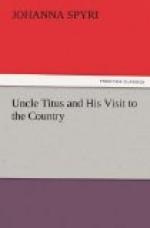He drew his wife’s arm in his, and they walked out to the garden, the whole swarm following, Wili and Lili capering about in most noisy delight that their father should suppose that he knew what the “surprise” was already.
As they passed out into the garden they passed under the great triumphal arch, with red lanterns hung on each side, lighting up the large tablet, on which was an inscription in big letters.
“Oh, oh, how splendid!” cried the father, now really surprised, “a beautiful arch and a poem of welcome. I must read them aloud:”
“Here we stand in welcome
Beside
the garden door,
How glad we are that
you’re at home!
We
feared you’d come no more,
So long you’ve
stayed—but now to-day
Forgot
is all our pain.
The whole world now
is glad and gay,
Papa
is here again!”
“That is fine—Rolf must have been the author of that, was he not?” and Wili and Lili jumped about more than ever, crying out,
“Yes, yes, Rolf wrote it, but we planned it all out and he made the verses, and Jule put up the poles and then we fetched the fir twigs.”
“That was a delightful surprise, my children,” said their father, much gratified. “How pretty the garden looks, all lighted up with red and blue and yellow lanterns. It looks like an enchanted spot, and now for my favorite apple-tree.”
The garden did look very pretty. The little paper lanterns had been made up a long time before, and this very morning Jule had fastened them about on all the trees and high bushes, and while the hand-shaking and kissing had been going on in the house, Battiste and Trine had lighted the candles. The big apple-tree was dotted all over with them, so that it looked like a huge out-of-doors Christmas tree, and the red apples shone so prettily in the flickering light, that altogether it would have been difficult to imagine a more charming scene.
The table, spread with a white cloth and loaded with all sorts of nice dishes, looked irresistibly attractive.
“What a beautiful banquet-hall,” cried the delighted father, “and how good the feast will taste! But what is this? Another poem?” and to be sure, a large white placard hung by two cords from the high bushes behind the apple-tree, and on it were the following lines:
“My first is good for man
to be—
Better than wealth.
My second we have longed to see
Our father do in health.
My whole with merry hearts we cry
Today, and shout it to the sky.”
“A riddle! Rolf made this too, I am sure,” said he, clapping the boy kindly on the shoulder. “I will begin to guess it as soon as I can. Now we must sit down and enjoy these good things before us, and the pleasure of being all together again.”
So they all took their places at the table, and each had his or her own story to tell of what had happened, and what had been done during the separation. There was so much to say that there seemed no chance for a pause.




